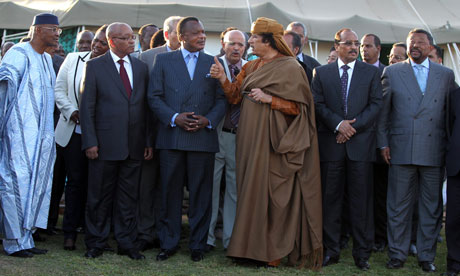The AU mission, comprising South Africa, Uganda, Mali, Mauritania and Congo-Brazzaville, is promoting a four-point plan, laid out this week in a communiqué from the organisation's Ethiopian headquarters. It stipulates an immediate ceasefire, the unimpeded delivery of humanitarian aid, protection for foreign nationals (including African migrant workers), and an inclusive national dialogue on political reform to meet "the legitimate aspirations of the Libyan people for democracy". On the face of it, this sounds reasonable enough. But in truth, the formula strongly favours the Gaddafi regime.
The Libyan opposition's transitional national council in Benghazi has made very clear that any outcome resulting in Gaddafi remaining in the country is unacceptable to them, but they lack the power to oust him. If the regime were to get away with a vague promise merely to talk about Libya's problems, it would undoubtedly represent a signal, possibly fatal defeat for the rebels. As matters stand, meanwhile, an immediate, unconditional ceasefire could foreshadow a potentially permanent partition – a result nobody is said to want.
The AU delegation's contradictory, evidently sympathetic approach to a man they call their "brother leader" is rooted in other considerations reaching far beyond what is simply best for Libya. For a start, South Africa's president, Jacob Zuma – and less secure fellow AU leaders – hardly welcome a renewed western military footprint in Africa. Having initially backed the UN action, Zuma has joined Uganda's president, Yoweri Museveni, and others in complaining that Nato is exceeding its brief. The idea that western countries can just get up and demand an African leader relinquish power is not something they wish to encourage.
Another factor at work is Gaddafi's close personal links to, and influence within, the 53-country AU. He has been on the scene longer than any other African leader. And although his past plans for a "United States of Africa" and similarly grandiose ideas were rebuffed, he is a serious player. Libya is reported to be one of five countries – the others are Algeria, Egypt, Nigeria and South Africa – that fund 75% of the AU budget. And countries such as Mauritania, Mali and Congo-Brazzaville, that now pose as impartial mediators in Libya, have benefited considerably from Gaddafi's oil-funded largesse and investments – part of his pan-African influence-peddling.
Gaddafi, for example, was the first leader to recognise Mauritania's president, General Mohamed Ould Abdel Aziz, after he seized power in a 2008 coup. Since then, Tripoli has cancelled $100m (£61m) in Mauritanian debt and provided bilateral aid worth $50m. Little wonder, then, that Mauritania is loth to see him go. Nor are they alone. According to a Stratfor report published by the independent Business Council for Africa, subsidiaries of Libya's $65bn sovereign wealth fund, the Libyan Investment Authority, have significant holdings in 31 African countries.
Uganda's Museveni, an AU elder statesman also involved in the Libyan mediation, offered a revealing insight into Africa's view of Gaddafi and the Libyan crisis in an article published in New Vision newspaper last month. Gaddafi had made many mistakes over the years, he said, such as backing Idi Amin, proclaiming himself "king of kings", and sponsoring Middle Eastern terrorism. But he also had "many positive points", he said.
"Whatever his faults, Gaddafi is a true nationalist. I prefer nationalists to puppets of foreign interests," Museveni said. Gaddafi had built up Libya's economy and infrastructure; and he was a moderate – "one of the few secular leaders in the Arab world". Western countries were guilty of double standards and should stop interfering in Libya, he went on. Why had repeated AU appeals for a UN no-fly zone in Somalia been ignored? Because Somalia had no oil. Libya's future must be decided by "internal forces" only. If the rebels could not prevail without outside help, then they did not deserve to win.
It's a fair bet Museveni's caustic opinions are widely shared not only in Africa but also by governments across the Middle East and the non-western world. They help explain why the AU mission in Libya will not produce a result that suits Britain and its allies. And they are also a clear indicator that the proposition that Gaddafi and his kin must, at all costs, be forced to relinquish power is very much a minority view, with scant support beyond London, Washington and Benghazi. With even France backsliding on its previous insistence on Gaddafi's departure, Cameron may have to accept the only way to end the war is to surrender its primary objective.
Source: The Guardian (UK)
